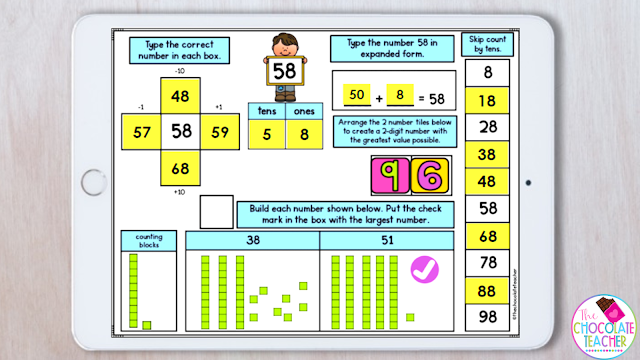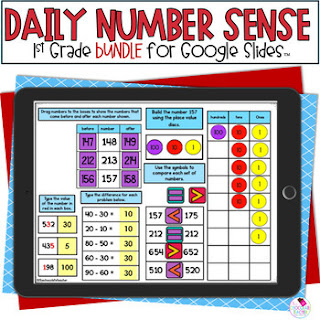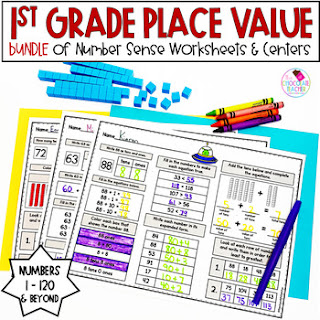Developing number sense is a key math concept that begins at an early age. At as early as two years old, children begin to identify objects before then can even count them. As time goes on understanding number sense will include understanding quantity, grasping concepts such as more and less, understanding symbols, recognizing relationships between numbers, making comparisons of numbers, and putting numbers in order. These skills are all developed with time and practice. Over the years, I have found that daily number sense practice is key. Today I'm excited to share how I use technology to engage my students in daily number sense activities.
My Number Sense Journey
As I began providing daily number sense activities, I saw my students showing a better grasp of these important concepts. Throughout the year, I try to do some self-reflection so that I can always be changing and adapting to the needs of my students. I've noticed that when compared to my previous years of teaching, the years with daily number sense activities have an overall better understanding of math concepts.
This ah-ha moment really made me a believer in using daily number sense activities. The constant focus and review help to keep these skills fresh in the minds of our students. It also provided the repetitive practice students need to master skills.
Using Daily Number Sense in My Classroom
As a busy teacher that often feels pulled in many directions, I knew that building this routine into my day had to be easy. With a little trial and error, my classes have found this morning math routine to provide a great consistent start to each day. Yep - I use this activity as daily morning work and my students know what to expect when they enter the room each day.
When completing this activity on paper, I like to have a daily number sense notebook or folder that keeps everything together for the entire month or even year. Using the digital activities students are able to use their tablets for our daily discussion and review of the activities. We review our answers together as a class, and I have my students check their own work. This allows them to make corrections as needed which is a great learning activity too. It helps to reinforce the correct answer and allows them to be successful.
Along with using this resource daily in the classroom, I often encourage my students to practice the skills at home. I like to give parents some easy and practical ways they can work on number sense skills at home too. These real-life number sense activities help students apply what they are learning in the classroom in a way that makes it personal. I often disguise these activities as "homework" but they are not what you think.
Here's a couple examples of what I would have students do:
- Count the number of forks in your kitchen. Count the number of spoons in your kitchen. Which has more? Which has fewer? Add the number of forks and spoons together. How many are there?
- At dinner have some fun playing with your food! It's okay mom and dad, there's a good reason. Have mom or dad say a number between 1 and 50. Use your food to build that number with food place value blocks. For example, carrot sticks could represent ten rods and peas could represent one cubes.
A Sneak Peek into Daily Number Sense Activities
My students just love these digital number sense activities. I created them to be used with Google Slides which makes them really easy to share using Google Classroom or a share link. Each day my students get one page to complete. On each page, they review a variety of important number sense skills and concepts. This constant spiral review and practice has been a game-changer!In a given week, students will work on a variety of different number sense skills. We focus on number recognition, counting and ordering numbers, and writing or typing the number. The students learn the familiar layout of the pages as we work on part-part-whole, addition, finding the number on a number line, building sets, ten frames, and place value.
This example in month eight shows just how far students will come during the year. Here students will be completing more advanced number sense activities as their understanding of numbers and their meanings develop. My goal is to always challenge my students and keep them moving forward without being frustrated.
By the end of the year, students are working with numbers up to 120 and beyond as they apply what they have learned to even larger 3-digit numbers. They are able to break the number down, build the number in multiple forms and use the numbers in both addition and subtraction.
The activities are designed to use a hands-on learning approach which is perfect for helping our young learners understand these abstract concepts. Math manipulatives, whether physical or digital, help students concretely see what the numbers represent.
Grab the Digital Daily Number Sense Activities
I decided to pull all of my digital daily number sense activities together in one place in order to help other teachers see the same great results that I was seeing. The result was the Daily Number Sense Bundle for First Grade. These ready to use Google activities will have you prepared for the entire school year.
If digital activities don't work in your classroom you can find the printable Daily Number Sense Bundle here.
Save these Digital Number Sense Activities
I don't know about you, but I am always finding teaching ideas that I love. However, I can't always remember where I saw them. Pinterest to the rescue! Just save this to your favorite classroom Pinterest board so you can quickly come back when you need more number sense or other classroom ideas.


.png)





.png)







0 Comments